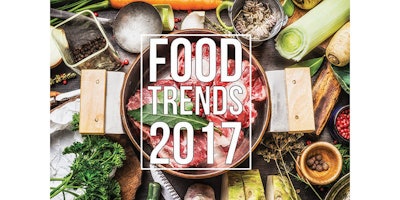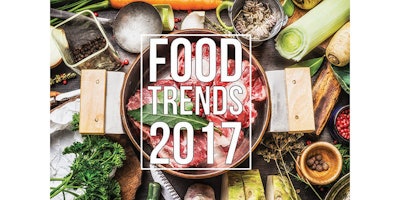

Stillwater, Okla. (Dec. 7, 2016) — Plant-based protein, dessert for breakfast and healthy vending options are on the menu for 2017, as Oklahoma State University’s Robert M. Kerr Food & Agricultural Products Center selects the hottest food trends for the upcoming year.
Andrea Graves, FAPC business planning and marketing specialist, said change is inevitable and trends help indicate what is coming next.
“Businesses need to pay attention to trends in order to find new growth opportunities and their target audiences,” Graves said. “Understanding these trends help businesses stay ahead of upcoming change, whether it is regulatory or a new flavor profile. Also, in most cases, consumers drive the trends and are looking for products and companies that are meeting their needs and lifestyles.”
Take a look at the top 10 trends for 2017, according to FAPC.
1. Reducing Food Waste
According to the Food and Agriculture Organization of the United Nations, approximately 33 percent of food in the United States is wasted. Foods previously considered “too ugly” to eat, and the “scraps” from fruits and vegetables will be used instead of discarded.
2. Cook and Connect
Why dine alone when you can eat with strangers? Apps and websites connecting strangers over a home-cooked meal are increasing in popularity. Websites like EatWith provide a network for people to sign up for meals in various places around the world and then enjoy multiple courses while networking with a group of people. These apps and websites allow people who enjoy cooking to show off their skills, while those who enjoy eating can embrace the ambiance and not have to worry about making dinner.
3. Wake and Cake
Life is short. Eat dessert first. In 2017, you may be eating dessert as the first meal of the day. Research conducted at Syracuse University found eating dark chocolate improves reasoning, memory and focus, which are all excellent in preparing for the workday. In addition, Tel Aviv University research suggests dessert for breakfast promotes weight loss. Combine the two and it’s a chocolate win-win scenario.
4. Natural Foods
Consumers are seeking all-natural food options for the home and at restaurants. According to a Packaged Facts survey, 60 percent of people who eat meat and poultry at restaurants consider all natural important in their selection process. This trend will continue in 2017 as consumers continue to want to know what is in their food.
5. Butcher-to-table Dining
Combining restaurants and butcher shops into one convenient location will be more prominent in 2017. These locations give consumers the option to purchase fresh, locally produced meat to cook at home, or they can select the meat they want and enjoy a meal at the restaurant.
6. Drone Delivery
As technology advances, so do delivery methods. While this trend is still in the early phases of adoption, it’s not entirely farfetched. On the Virginia Tech campus, drones are delivering burritos, New Zealand has a drone to deliver Domino’s pizza and drones in Reno deliver 7-Eleven slurpees and sandwiches. In 2017, we may see this trend increasing among more businesses in various cities.
7. Local Foods
Consumers continue to be interested in buying local produce and meat, and almost 50 percent of consumers are willing to make an extra effort to do so. Chefs are incorporating more locally grown products into their meals to support local producers and meet customers’ demands for transparency of foods.
8. Plant-based Protein
Consumption of plant-based protein is on the rise, and chefs are composing meals made entirely from vegetables. This trend comes from consumers’ desires to not eliminate meat, but include additional plant-based protein in their flexitarian diets.
9. Healthier Vending Machines
Healthy eating is at the forefront of American food trends this year. In response, businesses are introducing vending machines with healthier snack options, such as hummus and granola bars. These machines take traditional vending a step further by displaying nutrition information and offering suggestions for pairing food and drinks.
10. Soda Tax
Philadelphia, Pennsylvania and Berkeley, California, were the first cities to impose a tax on sugar-sweetened beverages. Residents in Boulder, Colorado, Cook County in Illinois and three California cities, San Francisco, Oakland and Albany, recently voted to impose a similar tax. These taxes are designed to decrease soda consumption to help combat obesity and to encourage selecting more nutritional drinks. If successful, this trend could occur in other cities soon.
FAPC, a part of OSU’s Division of Agricultural Sciences and Natural Resources, helps to discover, develop, and deliver technical and business information that stimulates and supports the growth of value-added food and agricultural products and processing in Oklahoma.






















